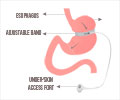Q: Which doctor treats obesity?
A: A general practitioner treats obesity.
Q: Does a low calorie diet help in losing weight?
A: Yes. Weight reduction can be achieved by reducing food intake and by regular exercise. A low calorie diet should constitute a low carbohydrate, high fiber, moderate protein and a low fat diet.
Q: Does maternal obesity pose a risk to the mother or child?
A: Yes. A number of pregnancy-related complications like hypertension, gestational diabetes and blood clots can occur in heavy pregnant women as well as complications in delivery. Recently a study has said that maternal obesity confers a risk of having a child with cerebral palsy.
Q: How do you prevent childhood obesity?
A: WHO recommends exclusive breastfeeding for the first six months of life for infants, nutrition-rich solid foods from 6 months onward, increased consumptions of vegetables, fruits, whole grains and nuts and regular physical exercise of about 60 minutes a day.
Q: What are the complications that arise due to childhood obesity?
A: Obese infants and children are at an increased risk for cardiovascular disease, insulin resistance, osteoarthritis and some cancers.
Q: What are the various classes in obesity?
A: Obesity has 3 classes based on the BMI number.
Classification
-
Class 1 / Moderately obese / low-risk
Class 2 / Severely obese / moderate-risk
Class 3 / Morbidly obese / high-risk
-
30.0 - 34.9
35 - 39.9
40 and higher
Q: What is morbid obesity?
A: Morbid obesity is reached when the weight of an individual is 100 pounds more than the ideal body weight, the BMI is 40 or more or the BMI is 35 or more accompanied by an obesity-related health condition.
Q: What is abdominal obesity?
A: Abdominal obesity is excess fat accumulation specifically around the stomach and abdomen areas causing a negative impact on health. It is also called central obesity and has been linked to cardiovascular disease, Alzheimer’s disease as well as other metabolic and vascular diseases.
Q: How can the food industry help curb childhood obesity?
A: By reducing fat, salt and sugar content in complementary and processed foods and by substituting unhealthy foods with nutritious and healthy foods.
Q: How much does obesity cost the US each year?
A: As of 2008, the US spends as more that 147 billion dollars a year on obesity healthcare cost.





























